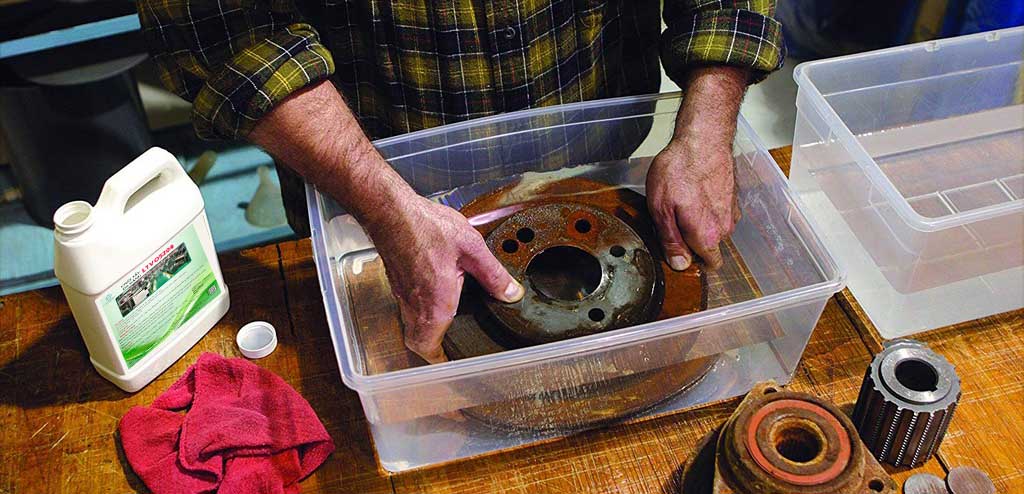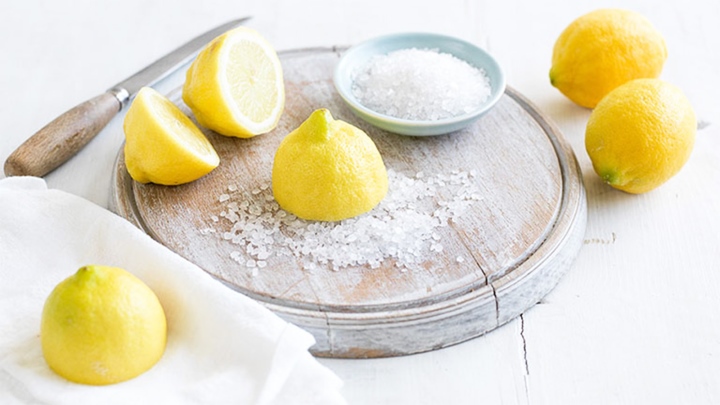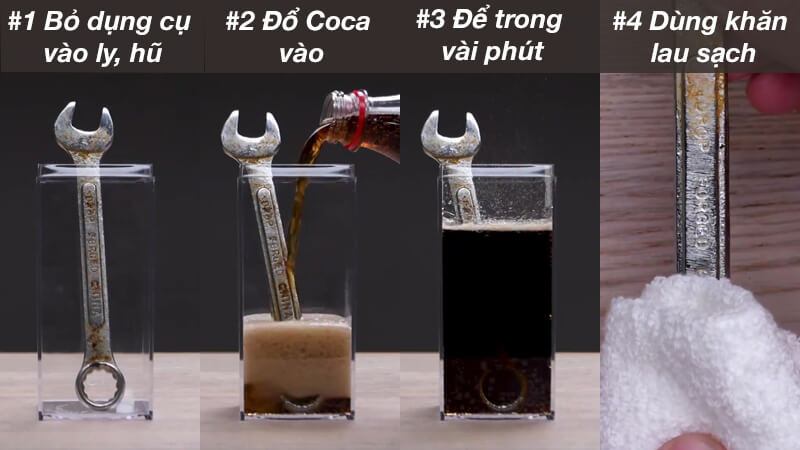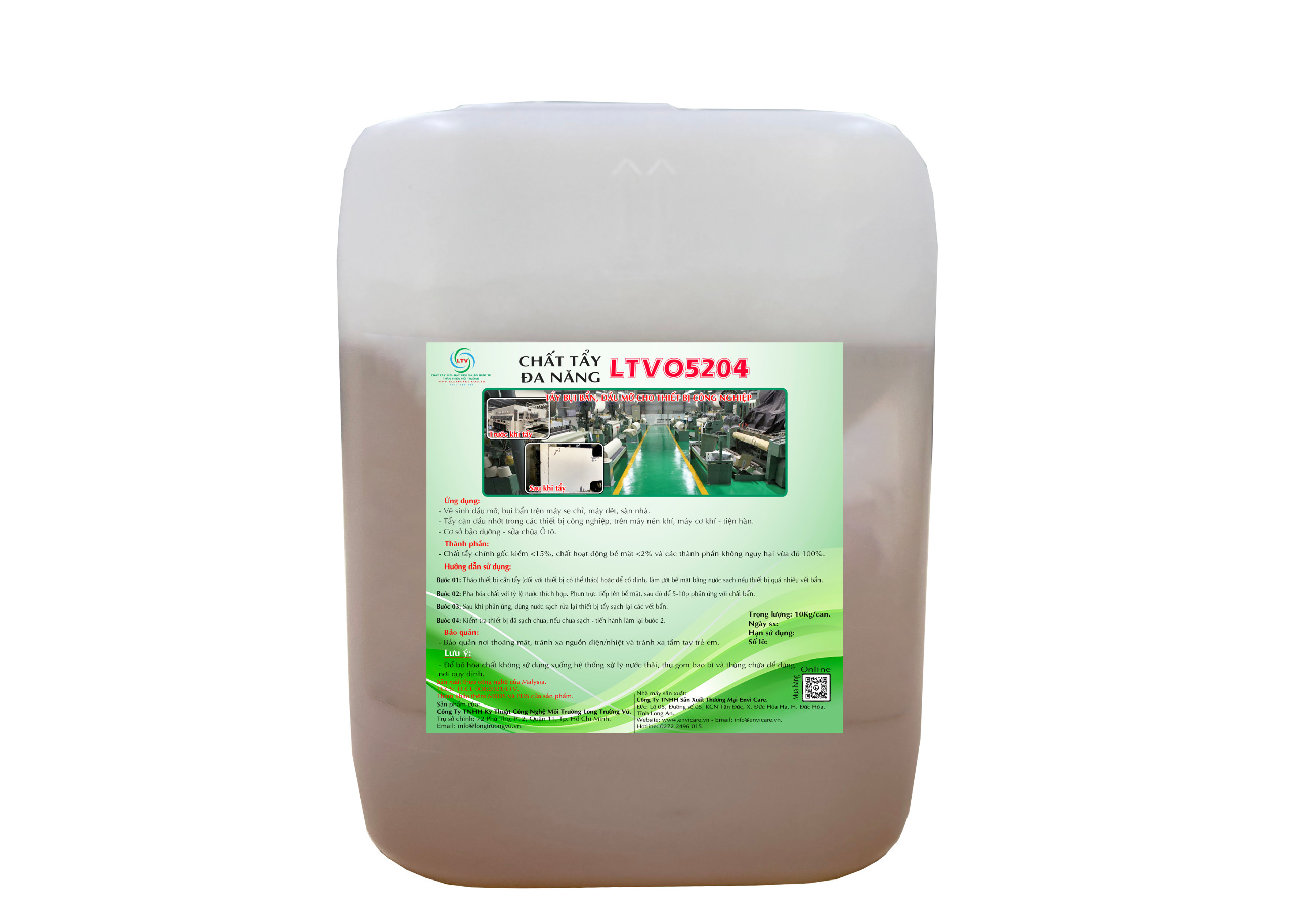#6 TIPS FOR CHOOSING RUST REMOVER ON METAL SURFACES
When using household tools like knives, needles, hammers, scissors, etc., they often encounter rust, which causes them to lose their sharpness and original beauty. In the manufacturing industry, most equipment and machinery are made from materials such as copper, stainless steel, iron, etc., which are susceptible to oxidation over time. In this article, Cleancare will guide you on how to effectively remove rust stains and preserve them.
What Is Rust?
Rust (or iron rust) is the phenomenon that occurs when iron undergoes oxidation. To understand this process better, let’s examine the specific steps:
- First, rust forms due to the interaction between iron (Fe) and oxygen (O2) in the air.
- One notable sign of iron rust is the appearance of a layer of scales on the iron’s surface. This layer easily flakes off when subjected to force or friction with a hard object. The color of this layer can vary from brown, reddish-brown to red, depending on the structure and condition of the original iron.
- Initially, rust does not significantly affect the quality of iron. However, when left for an extended period, it can become a formidable corrosive agent. Typically, a piece of rusted iron can increase in volume by up to 8 times compared to its original state. In this state, the iron becomes soft and easily brittle.
When iron is in this state, it readily reacts with water (H2O) and can crumble. This is the main reason why some machines are susceptible to damage when exposed to prolonged sunlight and rain outdoors.
Chemicals, Acid Rust Removers

Rust removers are commonly used chemicals to eliminate dirt and rust stains that may appear on the surfaces of household equipment, machinery, or metal products.
Iron rust removers penetrate the metal surface and then remove the rust layer clinging to the surface.
Although they have high cleaning efficiency, due to their strong acid content, they can cause significant corrosion to the equipment’s surface after use. However, because of their effectiveness and time-saving properties, many businesses and households still prefer to use them.
Pocket-Friendly 6 Ways to Remove Rust Stains on Metal, Stainless Steel, Copper, and Iron
Salt and Lemon

Using salt and lemon is a simple and effective method to prevent the formation of rust on metal surfaces. Here’s how to do it:
Step 1: Depending on the rust-affected area, sprinkle a sufficient amount of salt onto the metal surface. Step 2: Use lemon juice prepared in advance to evenly moisten the area where you have sprinkled salt. Step 3: Wait for 30 to 45 minutes for the chemical reaction to occur. Step 4: Afterward, use a clean cloth or lemon peel to gently rub on the rust stains. This ensures effective removal of stubborn rust stains.
Coca-Cola

Some may know that Coca-Cola or Pepsi contains a small amount of corrosion material (this substance is permitted for use and is not harmful to human health). You can use this type of water to clean tools affected by rust.
Materials you will need include Coca-Cola, Pepsi, or carbonated water, aluminum foil, a cleaning cloth, and clean water.
The process includes four basic steps:
Step 1: Pour Coca-Cola into a glass, bowl, or any container suitable for soaking rusted tools. Step 2: Fold the aluminum foil to fit your palm and use it to scrub the rust. Step 3: After thorough scrubbing, rinse with clean water. If rust stains persist, continue using Coca-Cola to scrub. Step 4: Finally, use a clean cloth to dry the equipment.
Sandpaper
Using sandpaper is an effective method for removing rust from metal surfaces.
To perform this method, you need to prepare lubricating oil. Apply this lubricating oil to the rusted surface and use an electric grinder or fine-grit sandpaper to rub the rusted area.
This grinding process creates a smooth surface and removes the rust layer from the metal surface, leaving a clean surface and preventing further rust development.
Toothpaste
Cleaning with toothpaste is a unique way to remove rust stains from metal surfaces.
Toothpaste contains a specialized cleaning agent for dental hygiene.
You can take advantage of the chemical properties of this substance to create a reaction with the elements present in iron rust, forming compounds that effectively clean rust stains.
To perform this method, you only need a few basic materials, including toothpaste, a brush, a cloth, and a pad.
The process involves the following steps:
Step 1: Apply a sufficient amount of toothpaste to the rust spot on the metal surface. Step 2: Use a cloth, pad, or brush to create foamy bubbles by brushing. Step 3: Brush until you see the rust stain has disappeared, then rinse with water to complete the cleaning process.
Onion
Using an onion is a method that not only removes rust but can also be applied to brighten objects such as rings, silver, pans, or knives.
To perform this method, you only need to prepare an onion.
The execution is very simple: cut the onion into pieces and then use them to rub on the rusty area. Continue rubbing until you see the rust stain disappear, then rinse to complete the cleaning.
Using Rust Remover Chemicals on Specialized Metal Surfaces

If you have a busy life and little time for detailed cleaning, you can easily purchase specialized rust remover chemical products to effectively remove rust stains.
LTV O5204 multipurpose rust remover represents a breakthrough in the field of cleaning and removing dirt and rust stains on various surfaces. With advanced formulas and high efficiency, this product offers convenience and excellent performance in the cleaning process.
Here are some specific details about LTV O5204 multipurpose rust remover:
- Powerful cleaning efficiency helps remove stubborn dirt and stains on surfaces.
- Versatile and flexible, it can be applied in various industries and areas requiring cleaning agents.
- Safe, easy to use, and user-friendly, it is not harmful to the environment.
- The product is suitable for various fields and industries.
In addition to removing stubborn rust stains on various industrial or household equipment surfaces, Cleancare LTV O5204 can also clean mold on rubber molds, heat sinks, and is suitable for car maintenance.
Link to Cleancare
LTV O5204 chemical rust remover product: https://cleancare.com.vn/san-pham/chat-tay-da-nang-ltvo5204-tay-moi-vet-ban/
Rust Prevention Methods and Chemicals for Iron and Steel
Here are some effective methods to prevent rust:
- Use rust-resistant alloys: You can use alloys such as chromium oxide iron to prevent rust.
- Plating: Apply electrostatic or zinc, aluminum, or cadmium plating to create a protective coating. When you plate these materials, the plating layer will be exposed to rust before it has a chance to corrode into the original material.
- Control humidity in storage areas: When storing goods, use silica gel to maintain stable humidity and prevent rust.
- Rust-resistant coatings: In addition to plating, you can use rust-resistant coatings to create a protective layer on the surface of iron materials. This method is often used to protect products such as steel ships or cars.
- Regular use of rust-inhibiting chemicals: To maintain and protect metal surfaces from rust, use rust-inhibiting chemicals regularly.
Special Promotion for Readers. Get a Free Trial of the Product!
Registration Form: https://forms.gle/HQ7jkubka2X14Jiz8
HOTLINE: 0914.711.499
Long Trường Vũ Online Store on E-commerce Platforms:
Visit the LAZADA store here: https://www.lazada.vn/shop/long-truong-vu-ltv/
Long Trường Vũ – Headquarters:
Location: 72 Phú Thọ, Ward 2, District 11, Ho Chi Minh City Email: info@longtruongvu.vn
Website: cleancare.com.vn
HCM Representative Office:
Address: 21-23 Nguyễn Biểu, Ward 1, District 5, Ho Chi Minh City Phone: 0914.711.499



